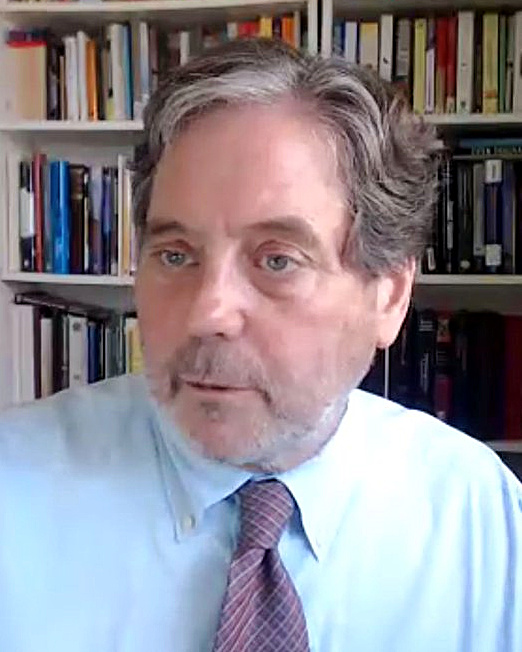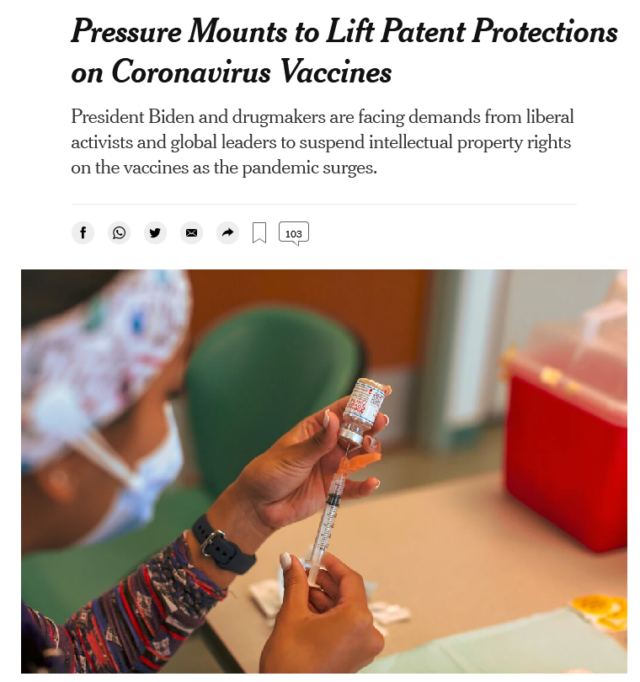‘Government Money That’s Gone into Vaccine Development Is Being Privatized by a Handful of Companies’
CAPITALISM, 17 May 2021
Janine Jackson | Fairness & Accuracy In Reporting - TRANSCEND Media Service
CounterSpin Interview with James Love on Bill Gates & Vaccine Politics
12 May 2021 – Janine Jackson interviewed Knowledge Ecology International’s James Love about Bill Gates and vaccine politics for the May 7, 2021, episode of CounterSpin. This is a lightly edited transcript.
Janine Jackson: A recent New York Times story, “Pressure Mounts to Lift Patent Protections on Coronavirus Vaccines,” reported that President Biden and drug makers face demands from “liberal activists and global leaders” to suspend intellectual property rights on vaccines, as people continue to die and suffer myriad long-term harms from a virus for which vaccines exist.
It’s possible to overwork Plato’s metaphor of shadows on the cave wall, where you get caught up in the image of the image of the thing and lose track of the real. But when you read, “The debate on waiving an international intellectual property agreement that protects pharmaceutical trade secrets is both a political and a practical problem for President Biden, who has vowed to restore the US as a leader in global health,” you might wonder where the people are, the dead and the sick and the ones who don’t even know they’re sick, and their families and loved ones?
There is assuredly a human interest story to be found elsewhere, maybe with big, poignant photographs. But what’s lost by not bringing those voices into this straight news story, where an investment banker is cited on the “terrible, terrible precedent” opening access to vaccine production would set: “What it would say to the industry is: ‘Don’t work on anything that we really care about, because if you do, we’re just going to take it away from you.’”
And then, finally, what’s this all to do with Bill Gates? Joining us now to put it together is James Love, director of Knowledge Ecology International. He joins us by phone. Welcome back to CounterSpin, Jamie Love.
James Love: Thank you very much. It’s a pleasure.
JJ: We’re recording on May 6, and things are shifting as we speak. There has been, I understand, a waiver on those intellectual property rights. I’ll ask you, then, just to kind of drop us in where we’re at.
That same New York Times story, which I’m just using to stand in for a lot of coverage, talked about debate inside the White House, that some advisors to President Biden say there’s a moral imperative to act, to get more vaccines out to more people, but “others say spilling closely guarded but highly complex trade secrets into the open would do nothing to expand the global supply of vaccines.”
So that seems to be the gist of the argument. I wonder, before you even talk about Bill Gates, can you talk about this idea that, oh, everybody wants everyone to get vaccines, but somehow loosening patent protections or IP rights isn’t the way to get there?
JL: The Times story you talked about, there’s two different things that we’re talking about: One is the issue of the patents themselves, which are not secret. Patents are granted; they’re published and anyone can read them. That’s one of the important things about a patent. Trade secrets have to do with the know-how, how to manufacture a vaccine. And those things are often kept secret by a company.
So in the current environment, where you’re trying to increase the manufacturing and the supply of vaccines so you can vaccinate more people around the world and do it faster, both of these things are important.
The patent is an exclusive right; it allows somebody that has ownership of an invention to prevent anyone but themselves from practicing that invention, so that can make it illegal to manufacture a vaccine, for example.
If you acquire somehow, either by paying for the patent or having the government override the patent right through a compulsory license to that patent—where the government forces the owner of the patent to give a license to someone to manufacture—then you still are faced with this problem of, do you know how to manufacture it? Where’s the know-how? And that’ll often involve a lot of things that you could describe, in some cases, as “trade secrets.” So both of these things are important for scaling the vaccine response.

Medium (3/20/21)
JJ: So then what about the idea that allowing access to them actually wouldn’t change the global supply of vaccines, which is an argument that’s been put forward by, among other people, Bill Gates, who as you’ve written and talked about recently, is a real powerful force in this sphere?
JL: I think most people would agree that if you somehow got rid of the barriers that patents present, by forcing people that own the patented inventions to allow third-party generic manufacturers to use those inventions to make a generic vaccine, and also shared the know-how, that would, in fact, definitely expand the production and supply of vaccines.
I think that what Bill Gates’ opinion is that that’s a bad idea. He would argue that breaking down the strong protection of patent rights and know-how would be bad in some ways, because he thinks the private ownership of both the know-how and the inventions is a positive. He thinks they’re what makes the world go around. He’s a strong advocate of strong monopolies on both inventions and know-how. He thinks that’s necessary in order to get private investment.
But it’s a pretty weak argument in this particular case because every single vaccine that’s on the market today has had the backing of governments in the development. Even the Pfizer vaccine—which, the Pfizer CEO likes to claim, didn’t get any research contracts from the US—they started out with 400 million euros from Germany and another 100 million in support from European connections and a $1.95 billion advance purchase contract from the United States. And that’s not really completely a story of free enterprise; that’s a story of governments really putting money into developing a vaccine.
For Moderna’s vaccine, for the Novavax vaccine, the Johnson & Johnson vaccine, the Oxford-AstraZeneca vaccine, all of those other vaccines had even more support from governments. And you can say the same thing about some of the vaccines in development or from other countries, like Russia or Cuba.
What you have right now is a lot of government money that’s gone into vaccine development being privatized by a handful of companies, and those companies saying, “You know, we’re going to decide who is allowed to manufacture and who’s not allowed to manufacture, and how fast things go and what prices we want to charge.” But there’s massive economic dislocation worldwide. You have kids out of school, you have people losing businesses, you have people getting evicted, defaulting on loans, mental health problems and everything else.
To the companies, it’s not like they’re not making any money. Pfizer this year says they’re going to make $26 billion in selling their vaccine, Moderna claims they’re going to make about $20 billion selling a vaccine that the US government paid for, and the CEO of Moderna is said now to be worth over $5 billion. So I don’t think we have to really worry too much about these companies not making money.
JJ: And not being inspired to do more or to innovate, or whatever, supposedly, the inhibition is going to be.
JL: At the beginning of the pandemic, most of the companies, with the notable exception of Pfizer, but a number of companies claimed that they were going to operate on a nonprofit basis. As we go deeper and deeper into the pandemic, and now Pfizer and Johnson & Johnson, even AstraZeneca, are all talking about raising prices. In some cases, they’re turning around numbers like tenfold increases in the price of their products. As you move down the road, Pfizer suggests you might need to be vaccinated every single year. When you’re talking about vaccinating the entire planet, that becomes pretty expensive.
JJ: There’s plenty to be said about how being wealthy, however you get there, evidently conveys expertise, at least according to US news media, and to many other actors in society. Part of the reason that people have a distorted or misleading understanding of the balance of arguments, in terms of vaccinating people, has to do with media coverage and the outsized voices of people like Bill Gates.
I wanted to ask you, just finally, about media coverage. If we’re talking about Gates—he’s an expert on malaria, he’s an expert on public education, now he’s an expert on vaccines. And if you just look at sources, I’m not sure the voices we’re hearing are the voices that we actually necessarily need to hear. What’s your thinking on that?
JL: Well, there’s the song, “If I Were a Rich Man,” which is the notion that people think just because you’re rich, you must know. And that’s one issue that you have, but it’s more than that. Gates personally—and his foundation, which has some of his money—spends a huge amount of money on public relations. They fund a lot of media organizations, they give money to BBC, they give money to lots of organizations that cover public health, and so they tend to give very favorable coverage to the projects that Gates is involved in. They offer money to all sorts of organizations, whether or not they take it or not, so it’s out there.
We once approached one publication, the Washington Monthly, about doing a story that involved Gates’ support of media organizations. And the reporter came back and he said he talked to his editors—and this is a really a small, niche publication in Washington, DC, one that we like, but it wasn’t really a major one—and the editor said, “That’s a great story. But we also have a grant application out to the Gates Foundation, so we’re just not going to write it.”
JJ: Wow.
JL: And there’s that kind of a problem. And then there’s the fact that not just Gates personally, his expertise, but his organization—they have consultants, they have organizations they fund that work on vaccines, he plays an important role in CEPI and in COVAX, too, the organizations who play a role in development and distribution of a vaccine for infectious diseases. He has consulting firms like McKinsey or Boston Consulting Group that work with them. And he knows the CEOs of companies, he has a lot of contacts and things like that.
So when the pandemic hit, very few people in government knew anything about vaccines or anything about infectious diseases, and so Gates was a famous guy; he has some expertise. So people would be like, “What does he have to say?” And because he was giving away a fair amount of money—or managing money; people like Warren Buffett were donating money—it seemed like he must be a pretty honest broker, because he’s pretty free of any kind of conflict, unlike a company.
But Gates himself has an ideological connection to strong intellectual property rights. Ever since he was in college, he’s always thought that strong intellectual property rights and strong privatization of government-funded research were good things, not bad things. He’s been focused on that his entire life, and I don’t think people realize how radical he is on those views. Even during the height of the AIDS pandemic, when there were very few people getting access to treatment, he was trying to block every effort to expand access to generic HIV drugs, despite the fact that there were probably 9,000 people a day dying from the disease at the time.

James Love: “People who have less power and less money around the world are the people last in line—and that line is going to be pretty long if you don’t speed up the production.”
So here we are, fast forward, it’s a pandemic, it’s Covid. And he’s telling people, “No, no, don’t worry about things. We’ve got the manufacturing all ready to go, we’re working with all the best people, all the best companies. We know more about this. The people that want more open sourcing of the vaccine are anti-capitalist, know-nothing activists. Listen to me, I’ll give you better advice.” So that was sort of the early role he was doing. And then he started to use his surrogates, like the Center for Global Development and other groups, to lobby against the TRIPS waiver. He personally started lobbying against it.
And when he was interviewed on Sky News about a different issue than the patent issue, he was asked about the know-how issue, he said he was opposed to sharing the recipe, or the know-how, how to make a vaccine, with developing countries and, more broadly, making it more public.
And I think that’s a ridiculously dangerous position to take, because the companies that are manufacturing vaccines right now are not remotely close to meeting demand, and if you go at the pace that they prefer, which is to keep the technology closer and control the pricing mechanisms, you’ll have a slower rollout that exposes us to risks of new variants, and it means people who have less power and less money around the world are the people last in line—and that line is going to be pretty long if you don’t speed up the production.
So it’s been difficult, because he has an outsized voice. And I think Gates is a smart guy; he’s not the only smart guy around or smart woman around. I think people need to listen to other views. And, actually, Gates has sort of a mental block about these issues, and so some of his arguments just don’t add up.
JJ: All right then. We’ll end there for now, with an eye towards tracking it as we go forward. We’ve been speaking with James Love. He’s director of Knowledge Ecology International. They’re online at KEIonline.org/. Thank you so much, Jamie Love, for joining us this week on CounterSpin.
JL: Thank you very much.
_______________________________________________
 Janine Jackson is FAIR’s program director and producer/host of FAIR’s syndicated weekly radio show CounterSpin. She contributes frequently to FAIR’s newsletter Extra!, and co-edited The FAIR Reader: An Extra! Review of Press and Politics in the ’90s (Westview Press). She has appeared on ABC‘s Nightline and CNN Headline News, among other outlets, and has testified to the Senate Communications Subcommittee on budget reauthorization for the Corporation for Public Broadcasting. Her articles have appeared in various publications, including In These Times and the UAW’s Solidarity, and in books including Civil Rights Since 1787 (New York University Press) and Stop the Next War Now: Effective Responses to Violence and Terrorism (New World Library). Jackson is a graduate of Sarah Lawrence College and has an M.A. in sociology from the New School for Social Research.
Janine Jackson is FAIR’s program director and producer/host of FAIR’s syndicated weekly radio show CounterSpin. She contributes frequently to FAIR’s newsletter Extra!, and co-edited The FAIR Reader: An Extra! Review of Press and Politics in the ’90s (Westview Press). She has appeared on ABC‘s Nightline and CNN Headline News, among other outlets, and has testified to the Senate Communications Subcommittee on budget reauthorization for the Corporation for Public Broadcasting. Her articles have appeared in various publications, including In These Times and the UAW’s Solidarity, and in books including Civil Rights Since 1787 (New York University Press) and Stop the Next War Now: Effective Responses to Violence and Terrorism (New World Library). Jackson is a graduate of Sarah Lawrence College and has an M.A. in sociology from the New School for Social Research.
Tags: Bill Gates, Capitalism, Coronavirus, Inequality, Mafia, Pandemic, Vaccines
DISCLAIMER: The statements, views and opinions expressed in pieces republished here are solely those of the authors and do not necessarily represent those of TMS. In accordance with title 17 U.S.C. section 107, this material is distributed without profit to those who have expressed a prior interest in receiving the included information for research and educational purposes. TMS has no affiliation whatsoever with the originator of this article nor is TMS endorsed or sponsored by the originator. “GO TO ORIGINAL” links are provided as a convenience to our readers and allow for verification of authenticity. However, as originating pages are often updated by their originating host sites, the versions posted may not match the versions our readers view when clicking the “GO TO ORIGINAL” links. This site contains copyrighted material the use of which has not always been specifically authorized by the copyright owner. We are making such material available in our efforts to advance understanding of environmental, political, human rights, economic, democracy, scientific, and social justice issues, etc. We believe this constitutes a ‘fair use’ of any such copyrighted material as provided for in section 107 of the US Copyright Law. In accordance with Title 17 U.S.C. Section 107, the material on this site is distributed without profit to those who have expressed a prior interest in receiving the included information for research and educational purposes. For more information go to: http://www.law.cornell.edu/uscode/17/107.shtml. If you wish to use copyrighted material from this site for purposes of your own that go beyond ‘fair use’, you must obtain permission from the copyright owner.

